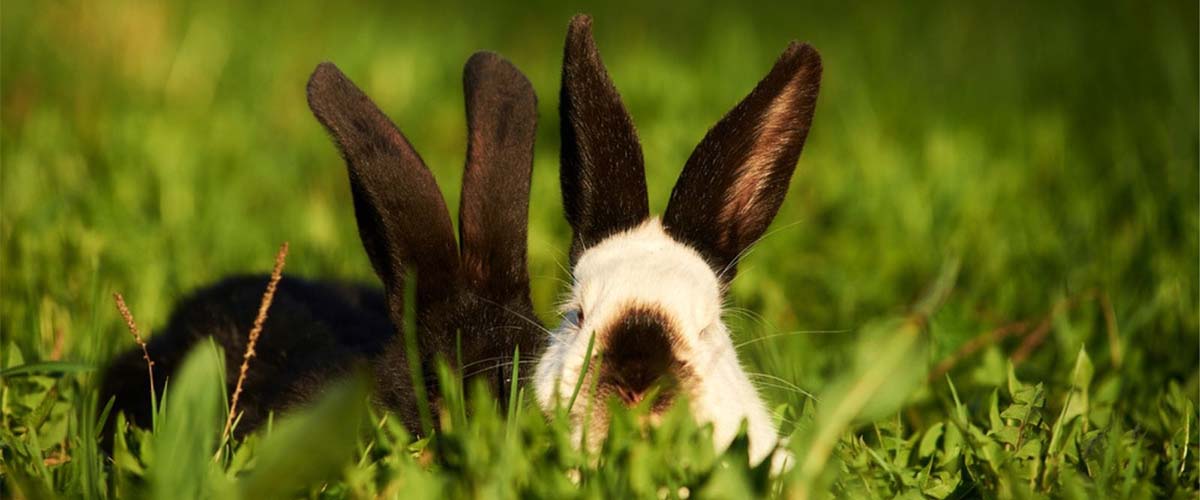Head tilt in a rabbit
Overview
- A head tilt in a rabbit is usually caused by a problem inside the ear or brain (where the balance centre sits).
- Inner ear infections and E.cuniculi (a tiny parasite that causes swelling in the brain) are the two most common causes of a head tilt in a rabbit.
- Most of the conditions that cause a head tilt also cause other symptoms such as loss of balance and flickering eye movements.
- Always contact your vet if your rabbit has developed a head tilt, and do so immediately if he/she has also lost their balance, seems distressed, is falling over, or has stopped eating.
Causes
Head position is controlled by the balance (vestibular) centre, which sits inside the ear/brain. Anything that disturbs the balance centre (i.e. a problem inside the ear/brain) is likely to cause a head tilt (wry neck/torticollis), and other symptoms such as a loss of balance or flickering eye movements. The two most common causes of a head tilt in rabbits are:
- An inner ear infection – a deep and serious infection inside the ear.
- E.cuniculi parasite (Encephalitozoon cuniculi) – a tiny parasite that causes inflammation of the brain, very common in rabbits.
Some other less common causes of a head tilt include:
- Ear mites
- Head injury
- Neck pain
- A drug reaction
- Inflammation, infection or an abscess inside the brain
- A brain or ear tumour
- Poisoning

This rabbit has a head tilt caused by a brain parasite called E.cuniculi - image courtesy of Elisabetta Mancinelli.
Other symptoms to look out for
If your rabbit has developed a head tilt, it will help your vet if you tell them about any other symptoms you may have noticed, such as:
- Loss of balance/falling over
- Walking in circles or bumping into things
- Flickering eye movements, uneven pupils, sinking of the eye(s)
- Third eyelid showing
- Head shaking an itchy ears
- Tremors
- Drooping on one side of their face
- Being unable to stand or rolling over uncontrollably (both severe symptoms)
Outlook
Your rabbit’s outlook will depend on what has caused their head tilt, how they respond to treatment and how they cope with the tilt (it often remains). Some head tilts (usually those caused by ear mites) get better with treatment, but most are permanent and stay the same or get worse over time. It’s important to speak to your vet about your rabbit’s outlook and quality of life when making any treatment decisions. Sadly, if your rabbit isn’t coping, or is getting worse, it may be kinder to put them to sleep.
When to contact your vet
Contact your vet if your rabbit has developed a head tilt, and do so immediately if he/she has also lost their balance, seems distressed, is falling over, or has stopped eating. You know your rabbit - even if they don’t have the exact symptoms listed above its best to contact your vet if you’re concerned.
Home care for a rabbit with a head tilt
To begin with, your rabbit may have poor balance and struggle to cope with their head tilt, but fortunately most adapt with time. You will need to take extra care to keep them comfortable and safe, by:
Providing a safe environment. Your rabbit will feel as though the world is spinning around them, and are likely to fall over and bump into things. Keep them in a flat area with lots of padding, no sharp edges and no deep water.
Keeping them calm. Stress will make your rabbit’s symptoms worse – keep them in a quiet, stress free, familiar environment.
Handling them gently. Moving your rabbit will make their symptoms much worse, so keep handling to a minimum and if you need to pick them up, do it very slowly and hold them securely.
Published: January 2021
Did you find this page useful?
Tell us more
Please note, our vets and nurses are unable to respond to questions via this form. If you are concerned about your pet’s health, please contact your vet directly.
Thank you for your feedback
Want to hear more about PDSA and get pet care tips from our vet experts?
Sign up to our e-newsletter
Written by vets and vet nurses. This advice is for UK pets only. Illustrations by Samantha Elmhurst.

